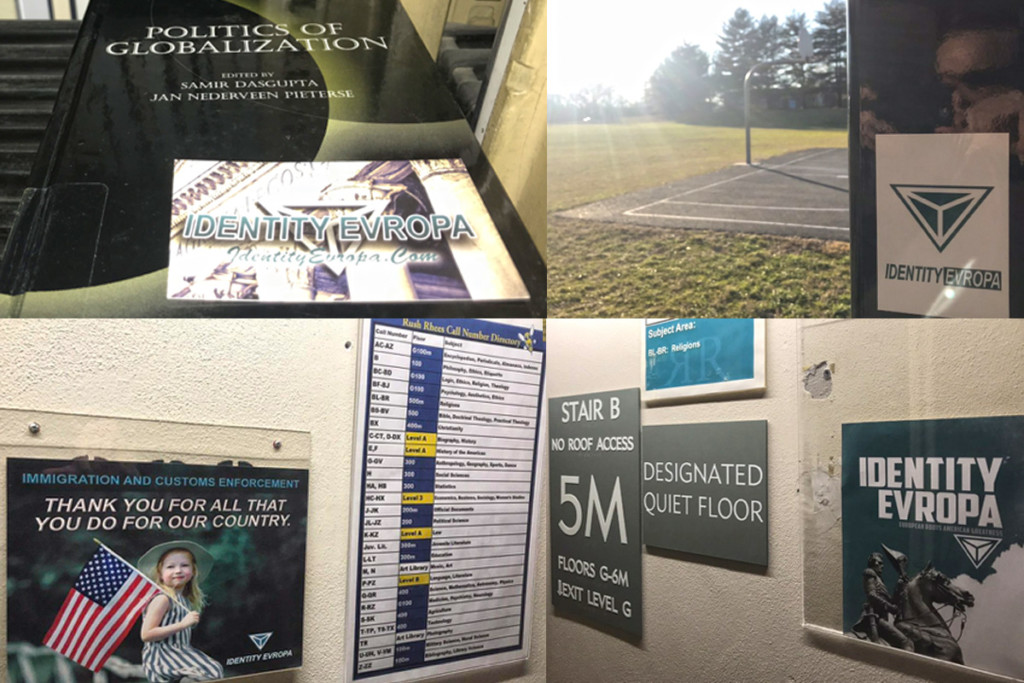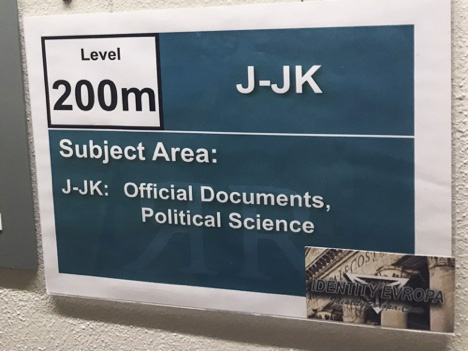Students researching globalization and immigration last fall could find relevant works in the stacks of Rush Rhees — along with cards advertising Identity Evropa, a white nationalist group.
“Alex Kolchak – NY” took credit for those postings in the group’s Discord server, which is now closed after its contents were leaked. The Huffington Post recently wrote about the leak and military members reportedly in the group. The outlet linked UR senior Christopher Hodgman to the Kolchak account.
Hodgman was cited by police earlier this month, accused of plastering Identity Evropa stickers in the Rochester suburb of Brighton (the citation was for placing stickers on public property, and not for their content). Hodgman’s name doesn’t appear in the server, but Kolchak also claimed credit for putting up fliers in Brighton last fall, as well as in Maryland’s Montgomery County where Hodgman is from.
The hate group’s leaked Discord archive reveals multiple parallels between Hodgman and Kolchak, who espoused white supremacist beliefs in his messages. Interviews with people who know Hodgman, meanwhile, reveal how the former president of College Republicans shifted his views toward the far-right. Hodgman did not respond to an email request for comment sent Tuesday.
However, a lawyer of his said in the Huffington Post article that just because his client posted Identity Evropa posters doesn’t necessarily mean he belongs to the group. The lawyer neither confirmed nor denied Hodgman’s connections to Kolchak.
—
“Nice Respectable People,” the group’s Discord server, was leaked March 6 by the far-left hacker group Unicorn Riot. The last post on the server is dated March 2.
Kolchak was active on the server from late last August to Feb. 28, according to the released archive. The leak contained nearly 3,000 messages from Kolchak on the server, an amount placing him 21st out of 886 users. Kolchak’s messages often spouted pro-white sentiments, such as “the million dollar question is whether we can achieve full white awakening before the demographic trend wins” and “we have to break the anti-white/anti-American conditioning before we can really promote European roots.”
The archive shows Kolchak documented his sticker placings on the server’s “activism photos” channel.
Kolchak placed fliers and stickers on town signs and mailboxes, bulletin boards and utility poles. There were two batches in Rush Rhees, just under a month apart, according to the server. In the first, six business cards were spread in textbooks and on a sign; the second batch featured a card placed on a sign for the political science stacks.
The propaganda contained Identity Evropa’s logo, a blue-and-white (sometimes only white) triangle known as “the dragon’s eye.” One design shows a horseback commander and the phrase “European Roots American Greatness.” Another features a young white girl, blonde and rosy-cheeked, and praises immigration officers for “all [they] do” for America.
Along with the apparent connections to Rochester, Brighton, and Hodgman’s home state, Kolchak’s username seemed based on a 20th-century Russian admiral, Alexander Kolchak. The user once recommended a 2009 television series called “The Admiral” that documents the Russian’s life. Hodgman, a member of the U.S. Army’s ROTC program, majors in Russian studies.
Within days of the leak, Identity Evropa rebranded as the American Identity Movement. The group’s logo is now a red, white, and blue eagle.
The group endorses racial segregation, believes ethnic diversity is ruining the United States, and promotes a closed-border, all-white America. The organization, which came into the public’s eye when it helped plan the 2017 rally in Charlottesville, tries especially to recruit on college campuses.
—
The day Hodgman’s police citation was announced, College Republicans published a statement disavowing their former president. “We hope the Republican Party chooses to purge itself of the Christopher Hodgmans of the world,” read part of the statement, written by senior Jose Fernandez, the club’s current president.
Hodgman’s route to conservative leadership was an indirect one.
As a first-year in 2016, he attended several College Democrats meetings, club president and senior Kavya Bana told the Campus Times. She said he then ran for and won an executive board position, effective the following semester.
Hodgman never served that term.
“He reached out to us before the beginning of fall 2016 over the summer to let us know he did not align with the Democratic Party anymore and no longer wanted to be a member,” Bana said.
Bana said that when Hodgman was involved with College Democrats, members “had no idea that he espoused views of hatred.”
—
Hodgman joined College Republicans in the fall of 2016 as a “born-again Republican,” said junior Anthony Pericolo, the club’s vice president.
Pericolo told CT that, from the start, Hodgman was “articulate,” “competently spoke his views,” and “seemed to know what he was talking about.”
Hodgman made media appearances in the winter of 2017 on the club’s behalf before becoming president, supporting embattled professor Ted Pawlicki and appearing on the WXXI radio show “Connections.” A few months later, Hodgman was elected.
Fernandez and Pericolo said Hodgman was almost entirely absent once he became president, leaving them to pick up the slack. “We hated Chris by the end of the first semester,” Pericolo said. “The e-board despised him.”
Hodgman stopped going to meetings, sending out emails, or organizing events with other groups, according to Pericolo.
“I’ve never seen someone actively avoiding responsibility like Chris,” Pericolo said. “He put us in a bad spot last year. And once we thought we were over it, the ghost of Chris came back and haunted us once more.”
—
Pericolo said Hodgman never expressed far-right views around club members and stuck to a traditional Republican platform. Hodgman had closed-border immigration views, he said, but didn’t express malice toward immigrants and instead made economic arguments. But sometimes, Pericolo said, the arguments were cultural.
“What he expressed was, if [immigrants] come in, then other people might feel that their culture is being displaced, sort of like the Trump effect,” Pericolo said. Still, the vice president wouldn’t have predicted Hodgman’s apparent white nationalist actions.
“This was a shocker,” Pericolo said. “He totally hid this from everyone.”
Fernandez, for his part, said he used to joke that he “wouldn’t be surprised if this guy turned out to be a white nationalist.”
After his presidential term ended, Hodgman attended one club meeting about immigration early last fall, during which he was “aggressive” and “did not conduct himself well,” Pericolo said. Pericolo and Fernandez said they never saw their former president after that, save for one time when Pericolo tracked him down later that semester to collect “money that he held from the club.”
Fernandez and Pericolo want to focus on the future. “Hopefully, this is the last we’ll have to deal with Chris,” Pericolo said.
—
Monroe County is no stranger to bigotry. In the fall of 2016, fliers for a website touting superiority of the European-White race were distributed in Brighton and Pittsford. A few months later, unrelated white supremacist fliers were posted at St. John Fisher College.
At UR alone, there were reports of 25 bias-related incidents last fall, one of which was made in response to Identity Evropa business cards on campus, according to Jessica Guzman-Rea, director of the Burgett Intercultural Center. Over the previous four semesters, the average number of bias-related incidents was 24.

A card Kolchak said he posted in College Town last November. Kolchak also documented posting trips in these New York locations: Rush Rhees library (twice), Brighton (twice), Pittsford (three times), Buffalo (three times), Rochester’s Genesee Valley Park, Dansville, Hammondsport, and Weedsport. Kolchak also hit the following places in Maryland: Baltimore, Cabin John, Potomac, and Silver Spring.
Dean of Students Matthew Burns hopes Hodgman will consider changing course.
Burns told CT he plans to meet with the senior this week with the goal of determining how he came into his beliefs and whether the senior is willing to listen to other viewpoints.
Burns explained that any student conduct response by the school regarding Hodgman will be independent of the senior’s legal proceedings, adding that suspension and expulsion as disciplinary measures are a last resort.
An Army spokesperson, as reported in the aforementioned Huffington Post article, said that Hodgman is under investigation, and that the Army prohibits “personnel from actively advocating supremacist, extremist, or criminal gang doctrine, ideology, or causes.”
President Feldman told CT that the University removed white nationalist material upon finding it in October, but is working with Public Safety, state police, and a crime lab to verify the culprit.
—
Larry Hudson, a UR professor who will teach History of White Supremacy next fall, sees how people like Hodgman could turn to extremism. “I do feel for […] young white males who have been asked to live in a society where things have been changing so rapidly over the last 40, 50 years,” Hudson told CT. “It’s all very confusing and I think a lot of these people sometimes isolate themselves from mainstream society and become even more disgruntled, more depressed, and they look for something.”
Hudson said he had no interest in Hodgman’s internal motivations and feelings, and that there are many reasons why an individual might turn to white supremacy.
Hudson elaborated that one of those reasons may have been that neither College Democrats nor College Republicans had what Hodgman was looking for, while white supremacy groups like Identity Evropa did. Hudson said that now is the best time to be a white supremacist in nearly a century. “If you’re a young kid,” he said, “and you were looking for some attention, if you were looking for some friendship, some community, why not?”
“Some ethnic groups join gangs, some join alt-right organizations — but I think they’re all suffering from that same sense of disconnectedness,” Hudson said. “And no one’s really speaking to them.”
Correction (3/21/19): A sentence was changed to reflect that 25 bias-related incidents were reported in the Fall 2018 semester. The wording previously indicated that the number of reports filed was 25, but 93 reports were actually filed for those 25 incidents.



